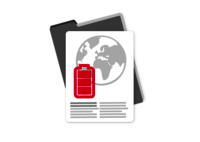EU Batteries Regulation Training
Ready for the new Batteries Regulation (EU) 2023/1542
The new EU Batteries Regulation (which replaces the Batteries Directive) places numerous requirements on producers, importers and distributors of the different types of batteries - from simple portable batteries to stationary industrial batteries. The EU Batteries Regulation is the first European legislation that follows a full product life cycle and includes new ambitious requirements on safety, labelling, sustainability, performance, supply chain due diligence and end-of-life management of portable and industrial batteries. Thus, all economic actors in the supply chain face major challenges in order to comply with the individual obligations from the EU Batteries Regulation even after its gradual entry into force.
How does trade-e-bility help me?
We offer a comprehensive, personal online training in which you will learn what obligations the EU Batteries Regulation places on you and how to deal with them in your specific case.
The training modules include, among other things, an introduction to the EU Batteries Regulation, as well as comprehensive information on how to implement your obligations with regard to labelling, documentation, Extended Producer Responsibility (EPR) and due diligence in the supply chain.
Training on the EU Batteries Regulation
| MODULE | CONTENT | TIME |
|---|---|---|
| Introduction | a) Introduction to the new Batteries Regulation. We explain the purpose, present the main sections and help you to find your way around the EU Batteries Regulation. b) We determine how you are affected, based on your role as an economic operator, sales territory, company size and types of batteries sold. | 30 min. |
| Labelling & information obligations | a) Mandatory labelling (manufacturer information, capacity, date of production, SVHC, etc.) b) Information obligations c) Battery passport d) CE marking etc. | 20 min. |
| Conformity assessment procedure | a) CE declaration of conformity b) Prerequisite for carrying out a conformity assessment procedure | 20 min. |
| Documentation & storage obligations, stocking of spare parts | a) Operating instructions and safety information b) Storage obligations c) Availability of spare parts etc. | 20 min. |
| Obligations in the area of Extended Producer Responsibility (EPR) | a) Registration obligations b) Take-back obligations c) Reporting obligations etc. | 20 min. |
| Due diligence in the supply chain | a) Affectedness analysis b) Necessary steps | 20 min. |
